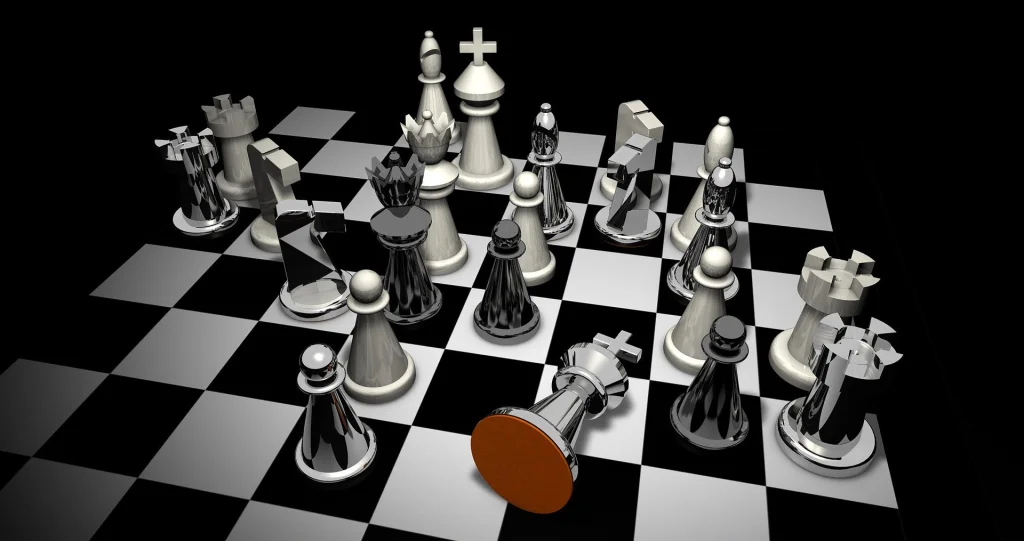“A pawn is a fierce device, sacrifice only if you must.”
Li Bai, ca. 751
Chinese poet Li Bai likens War to a Game of Chess where soldiers become pawns in a game played between generals.
Historical note. In 751 AD, three armies clashed at the Battle of the Talas River (怛羅斯戰役). The battle took place in central Asia, today’s northwestern Kyrgyzstan with forces of the Tang dynasty squaring off against the combined forces of the Abbasid Caliphate (followers of the prophet Muhammad) and the Tibetan Empire (traditional foes of the Tang dynasty). The Tang army was defeated, marking a change in Chinese fortunes.
去年战桑干源,今年战葱河道
洗兵条支海上波,放马天山雪中草
万里长征战,三军尽衰老
匈奴以杀戮为耕作,古来唯见白骨黄沙田
秦家筑城避胡处,汉家还有烽火然
烽火然不息,征战无已时
野战格斗死,败马号鸣向天悲
乌鸢啄人肠,衔飞上挂枯树枝
士卒涂草莽,将军空尔为
乃知兵者是凶器,圣人不得已而用之战城南, 李白
Last year we were fighting where the Sanggan River flows
This year we are fighting on the Onion River Road
We have washed our swords on the shore of the Parthian seas
And pastured our horses among the snows of the Tian ShanTen thousand leagues from home,
Three armies meet, weak and tired and grown gray.
The Xiongnu have no trade but battle and war
No lands or fields to plow,
Only wasteland where white bones lie among the yellow sandOnce the Emperor of Qin built the great wall to keep away the Hu,
On which, the Emperor of Han lit fiery beacons.
Today those beacons are lit forever, for fighting never ceases.
On the field of battle, fighting to the death,
Horses of the conquered cry piteously to the sky.
As carrion peck at human guts,
Carrying them in their beaks to hang on withered branches.
A warrior dies, his blood paints the grass
While Generals vainly plan.Know this: a soldier is a fierce device, a wise man uses only if he must
South of the Ramparts, Li Bai, written ca. 751

The Tang dynasty in the 8th century
By the middle of the 8th century, the Tang dynasty was at the peak of its power. Emperor Xuanzhong was on the throne. He was commonly called Emperor Ming, the Brilliant One. Chinese power and control stretched west along the Silk Road almost to the Caspian Sea. On the north, the Great Wall kept the Xiongnu and the Hu at bay. While the Tibetans had retreated to the high Tibetan Plateau, they remained a threat to China’s western territories. The Battle of the Talas River was such an opportunity.
Pinyin
qù nián zhàn sānggàn yuán ,jīn nián zhàn cōng hédào 。
xǐ bīng tiáozhī hǎi shàng bō ,fàng mǎ tiān shān xuě zhōng cǎo 。
wàn lǐ zhǎng zhēng zhàn ,sān jun jìn shuāi lǎo 。
xiōngnú yǐ shā lù wéi gēng zuò ,gǔ lái wéi jiàn bái gǔ huáng shā tián 。
qín jiā zhù chéng bì hú chù ,hàn jiā hái yǒu fēng huǒ rán 。
fēng huǒ rán bú xī ,zhēng zhàn wú yǐ shí 。
yězhàn gé dòu sǐ ,bài mǎ hào míng xiàng tiān bēi 。
wū yuān zhuó rén cháng ,xián fēi shàng guà kū shù zhī 。
shì zú tú cǎo mǎng ,jiāng jun kōng ěr wéi 。
nǎi zhī bīng zhě shì xiōng qì ,shèng rén bú dé yǐ ér yòng zhī 。
Notes
- Sanggan River (桑乾源, sānggàn yuán), originates in Shanxi province, which historically is referred to as west of the mountains.
- Onion River Road (葱河道, cōng hédào), Kashgar‑darya, modern Turkestan, referring to a place along the Silk Road.
- Parthian Seas (条支, Tiaozhi), believed to be that part of the Parthian empire where the Tigris River enters the Persian Gulf .
- Tian Shan, the Heavenly Mountains of Central Asia, modern Kyrgyzstan and other countries bordering the Silk Road.
- Xiongnu, nomadic tribes of the Asian steppes, the Mongols.
- Qin dynasty, China’s first imperial dynasty that began constructing the Great Wall of China.
- Hu, distinct from the Xiongnu, these nomadic people lived north of the Great Wall. Generally, any non-Han people, i.e. Chinese, tribes including the Khitan.
- Han dynasty. China’s second imperial dynasty.
- Yězhàn gé dòu sǐ, literally on a field, a grid. This is Li Bai’s reference to chess, which was invented in the 3rd century and played as an amusement in the Tang dynasty. The game becomes a fight to the death.
- Carrion, Li Bai specifically refers to Black Kite, which spend much time soaring and gliding in thermals in search of food.
- “A warrior dies, his blood paints the grass.” Li Bai was an accomplished painter. The visual image of blood coloring the yellow sand is easy to see in the mind’s eye.
- Bing, 兵 a pawn on a board of chess. A soldier, the most elementary piece in battle.








